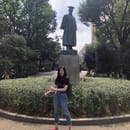“So, where are you from?” she asked, smiling. I hesitated for a few seconds before answering.
“I’m…uh, I’m American,” I said. I figured that skipping out on my cultural background would let me finish the conversation faster, but boy was I wrong.
The woman shook her head slightly, as if I’d somehow disappointed her.
“No, no. Where are you really from?”
I resisted the urge to roll my eyes.
“Oh, sorry – I was born in San Francisco!”
I was well aware of what she was trying to get me to say, but the cynical side of me couldn’t resist the urge to feign ignorance and annoy her a little bit more. I’d read countless articles about the problem with this loaded question (“Where are you [really] from?”) and yet somehow, I’d managed to get through the first 18 years of my life without actually being asked it.
Growing up as a third culture kid meant that I was raised in a melting pot that was both unique and illuminating. The fact that everyone was from a multicultural background meant that “Where are you from?” was rarely asked; in fact, the last time I ever had to talk about my nationality and/or ethnicity was in elementary school. Aside from the occasional ice breaker event, describing my cultural makeup was never an issue that I had to think about.

Photo by Levi Ventura
When I arrived at my dorm on move-in day – I used to be enrolled at an American university but withdrew and came to Waseda after my first semester – I was excited to get settled in my new home away from home. Everything seemed to be going smoothly until my roommate’s mom started asking me about myself; my roommate had left the room a few minutes earlier, and my mom had gone downstairs to look for a vending machine, leaving me alone with a complete stranger. I don’t know if it was the nerves that made me respond the way I did, but the fact that she had asked me such a question at all rubbed me the wrong way and left a bad taste in my mouth. ‘Why can’t she take a hint?’ I thought.
“San Francisco? But where are your parents from? Where did they come from?” she pressed on. I held back a sigh and tried to convince myself that she was unaware of what her question implied. I wanted to believe that my roommate’s mom didn’t realize her determination to uncover where I was “really from” suggested that she didn’t think I could possibly be an American just like her, and that she was simply expressing her curiosity in a way that could’ve been worded better.
“My parents are Korean, if that’s what you mean,” I said carefully. “I grew up in Indonesia, though.”
“Ah, so you’re Korean!” she said, her face lighting up. The satisfaction on her face was so clear that it made me unsure whether or not to laugh. “Your English is amazing, by the way – no accent at all!”
“Thanks? I attended an international school, so…”
She continued praising my (apparently) impressive, “accent-less” English and asking me some more questions until my roommate came back, at which point her interest in me magically faded away. I stood there completely dumbfounded; I didn’t know how I was supposed to react to the weird, almost backhanded compliments, let alone absorb the way she prodded me into saying that I was Korean, not American.
Although three years have passed since this exchange, I can’t help but think about it every once in a while. It’s strange that someone took a look at me and determined that I had to have a better answer than “American,” because, by that logic, I could’ve asked her about her history, too. What about me gave her the impression that I wasn’t (or couldn’t be) American? Why did my roommate’s mom think it was okay to ask me for my “real” name after I introduced myself as Christie? It’s written in my passport, so why wasn’t that good enough for her?
I guess what I want to say is this – if you ask someone where they’re from and they say X, don’t take it a step further by following-up with “No, where are you really from?” Not only is it irritating, but it also announces that you have a preconceived image of what a person from X looks/acts/etc. like, and that the person you’re speaking with doesn’t fit that mold. If they want to reveal more, they’ll do it themselves. No one should feel pressured to explain where they’re “really” from, so don’t force people into random, inappropriate pigeonholes. Seriously, just don’t do it.


